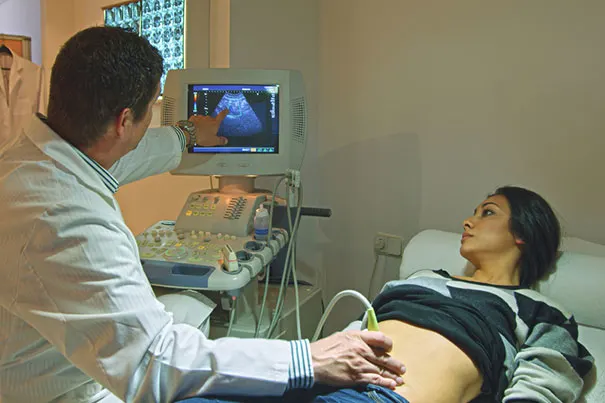What Is an Ectopic Pregnancy?
The good news is that ectopic pregnancies are rare. However, if they do occur, they require medical attention, so it’s helpful to know about them, just in case. Learn more about what an ectopic pregnancy is, and what an ectopic pregnancy can feel like.
What Happens in an Ectopic Pregnancy?
In a typical pregnancy that develops normally, a fertilized egg moves through the fallopian tube toward the uterus, where it implants and starts to grow. But in an ectopic pregnancy, the fertilized egg implants outside of the uterus, usually attaching itself to the fallopian tube (but occasionally to the ovary, cervix, or other places in the abdomen). These cannot hold a growing embryo, so the pregnancy cannot progress. The chance of an ectopic pregnancy occurring is relatively low, making up just 2 percent of pregnancies.
An ectopic pregnancy must be treated, and your healthcare provider will discuss and recommend the best options for you. Following are some of the causes, risks, symptoms, and treatments for this condition.
Causes of an Ectopic Pregnancy
Possible causes of an ectopic pregnancy can include:
Infection. An infected or inflamed fallopian tube can mean it becomes partially or entirely blocked so the fertilized egg can’t proceed along the tube.
Scar tissue. The egg may struggle to move through the fallopian tube if scar tissue from an infection or surgery blocks its way.
The shape of the fallopian tube. Sometimes, if the shape of the fallopian tube is abnormal due to an abnormal growth or a birth defect, the fertilized egg struggles to make its way through.
Risk Factors for an Ectopic Pregnancy
You’re more likely to have an ectopic pregnancy if
you’re more than 35 years old
you’ve had a previous ectopic pregnancy
you’ve had pelvic or abdominal surgery
you’ve had pelvic inflammatory disease
you’ve conceived after having a tubal ligation or while an IUD is in place
you smoke
you have endometriosis
you conceived using fertility treatments, or you are using fertility medications.
Signs and Symptoms of an Ectopic Pregnancy
You might be wondering how to tell if you have an ectopic pregnancy, particularly because some of the signs of an ectopic pregnancy are also normal signs of a healthy pregnancy that you might experience in the first trimester. Keep in mind that ectopic pregnancies are rare, and your healthcare provider is the appropriate person to make this diagnosis.
Some women don’t experience any symptoms at all. However, if you do develop symptoms, you will likely notice these signs of an ectopic pregnancy between the 4th and 12th weeks of pregnancy. These can include:
A sharp pain that comes and goes, and can vary in intensity. Ectopic pregnancy pain may be located in the pelvis, abdomen, or even the shoulder and neck.
Bleeding that may be heavier or lighter than your normal period. Remember, bleeding in early pregnancy could also be implantation bleeding, so consult your doctor.
Discomfort when peeing or pooping.
Weakness, dizziness, or fainting.
These symptoms can start very early in your pregnancy, at a time when you might not know you are pregnant yet or have had a positive pregnancy test.
In some cases, signs of an ectopic pregnancy will first be recognized by your healthcare provider during your first pregnancy scan.
Contact your provider right away if you notice sharp pains that last more than a few minutes, or if you have any bleeding. Go to the hospital ASAP if you have vaginal bleeding along with abdominal or shoulder pain or weakness, dizziness, or fainting.
Diagnosis
Your provider can make an ectopic pregnancy diagnosis by undertaking these kinds of examinations:
A pelvic exam to assess if there’s any pain, tenderness, or a mass in the abdomen.
An ultrasound to see where the pregnancy is developing.
A urine test or blood test to measure hCG levels. If the level of this pregnancy hormone is lower than expected, it could be due to an ectopic pregnancy.
What Are the Treatment Options?
Treatment for an ectopic pregnancy involves ending the pregnancy either by surgery or by medication and aims to restore the affected fallopian tub. Your doctor will talk you through the options, which can include:
Medication for ectopic pregnancy called methotrexate, which helps your body absorb the pregnancy tissue.
Minimally invasive surgery such as laparoscopic surgery, which involves removing the ectopic pregnancy tissue and repairing or removing the affected fallopian tube.
Removal of all or part of the fallopian tube may be suggested if the tube is stretched or has ruptured during the ectopic pregnancy, and can be a life-saving emergency procedure.
You might be wondering what to expect after ectopic pregnancy surgery. Your doctor will closely monitor your recovery after an ectopic pregnancy and any surgery, including rechecking your hCG level to make sure the ectopic tissue has been completely removed.
Can I Get Pregnant After an Ectopic Pregnancy?
If you're wondering if you can have a healthy pregnancy after an ectopic pregnancy, your best bet is to speak with your healthcare provider, who will be able to provide you with specific guidance based on your medical history.
Ectopic pregnancies are relatively rare and treatable, but if you notice any symptoms that worry you, consult your provider for reassurance and advice.

